EF-2 (phospho Thr56) Polyclonal Antibody
- Catalog No.:YP0870
- Applications:WB;IHC;IF;ELISA
- Reactivity:Human;Mouse;Rat
- Target:
- eEF2
- Fields:
- >>AMPK signaling pathway;>>Oxytocin signaling pathway
- Gene Name:
- EEF2
- Protein Name:
- Elongation factor 2
- Human Gene Id:
- 1938
- Human Swiss Prot No:
- P13639
- Mouse Gene Id:
- 13629
- Mouse Swiss Prot No:
- P58252
- Rat Gene Id:
- 29565
- Rat Swiss Prot No:
- P05197
- Immunogen:
- The antiserum was produced against synthesized peptide derived from human eEF2 around the phosphorylation site of Thr56. AA range:31-80
- Specificity:
- Phospho-EF-2 (T56) Polyclonal Antibody detects endogenous levels of EF-2 protein only when phosphorylated at T56.
- Formulation:
- Liquid in PBS containing 50% glycerol, 0.5% BSA and 0.02% sodium azide.
- Source:
- Polyclonal, Rabbit,IgG
- Dilution:
- WB 1:500 - 1:2000. IHC 1:100 - 1:300. IF 1:200 - 1:1000. ELISA: 1:10000. Not yet tested in other applications.
- Purification:
- The antibody was affinity-purified from rabbit antiserum by affinity-chromatography using epitope-specific immunogen.
- Concentration:
- 1 mg/ml
- Storage Stability:
- -15°C to -25°C/1 year(Do not lower than -25°C)
- Other Name:
- EEF2;EF2;Elongation factor 2;EF-2
- Observed Band(KD):
- 100kD
- Background:
- This gene encodes a member of the GTP-binding translation elongation factor family. This protein is an essential factor for protein synthesis. It promotes the GTP-dependent translocation of the nascent protein chain from the A-site to the P-site of the ribosome. This protein is completely inactivated by EF-2 kinase phosporylation. [provided by RefSeq, Jul 2008],
- Function:
- function:This protein promotes the GTP-dependent translocation of the nascent protein chain from the A-site to the P-site of the ribosome.,PTM:Diphthamide is 2-[3-carboxyamido-3-(trimethyl-ammonio)propyl]histidine. Diphthamide can be ADP-ribosylated by diphtheria toxin and by Pseudomonas exotoxin A.,PTM:Phosphorylation by EF-2 kinase completely inactivates EF-2.,similarity:Belongs to the GTP-binding elongation factor family. EF-G/EF-2 subfamily.,subunit:Component of the mRNA surveillance SURF complex, at least composed of ERF1, ERF3 (ERF3A or ERF3B), EEF2, UPF1/RENT1, SMG1, SMG8 and SMG9.,
- Subcellular Location:
- Cytoplasm . Nucleus . Phosphorylation by CSK promotes cleavage and SUMOylation-dependent nuclear translocation of the C-terminal cleavage product. .
- Expression:
- Brain,Cajal-Retzius cell,Epithelium,Hepatocyte,Ovary,Periph
- June 19-2018
- WESTERN IMMUNOBLOTTING PROTOCOL
- June 19-2018
- IMMUNOHISTOCHEMISTRY-PARAFFIN PROTOCOL
- June 19-2018
- IMMUNOFLUORESCENCE PROTOCOL
- September 08-2020
- FLOW-CYTOMEYRT-PROTOCOL
- May 20-2022
- Cell-Based ELISA│解您多样本WB检测之困扰
- July 13-2018
- CELL-BASED-ELISA-PROTOCOL-FOR-ACETYL-PROTEIN
- July 13-2018
- CELL-BASED-ELISA-PROTOCOL-FOR-PHOSPHO-PROTEIN
- July 13-2018
- Antibody-FAQs
- Products Images
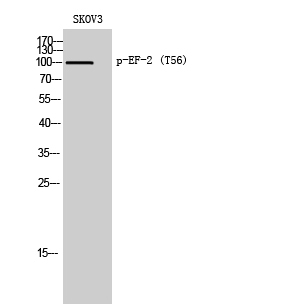
- Western Blot analysis of SKOV3 cells using Phospho-EF-2 (T56) Polyclonal Antibody diluted at 1:2000
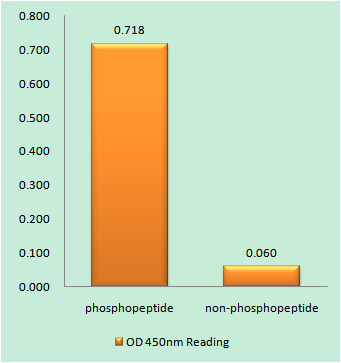
- Enzyme-Linked Immunosorbent Assay (Phospho-ELISA) for Immunogen Phosphopeptide (Phospho-left) and Non-Phosphopeptide (Phospho-right), using eEF2 (Phospho-Thr56) Antibody
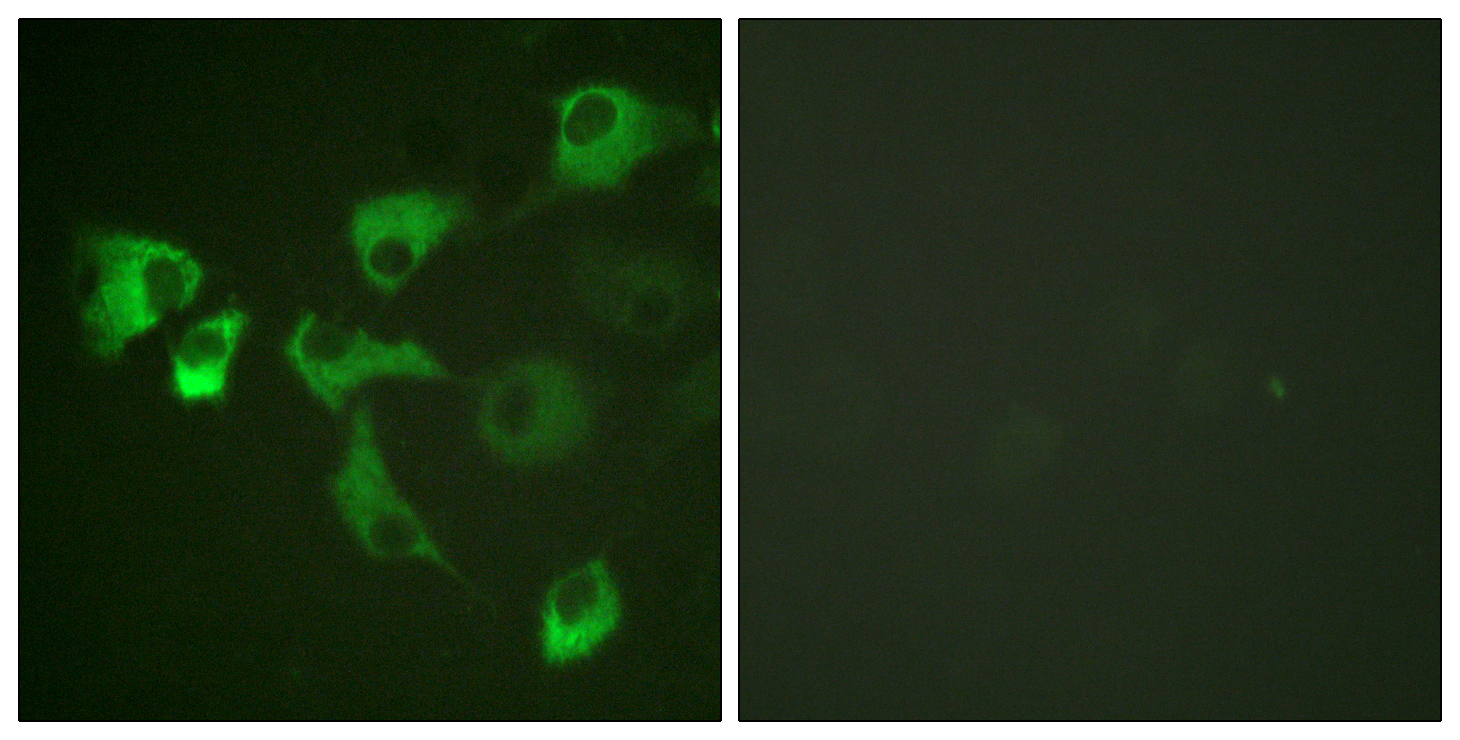
- Immunofluorescence analysis of HUVEC cells, using eEF2 (Phospho-Thr56) Antibody. The picture on the right is blocked with the phospho peptide.
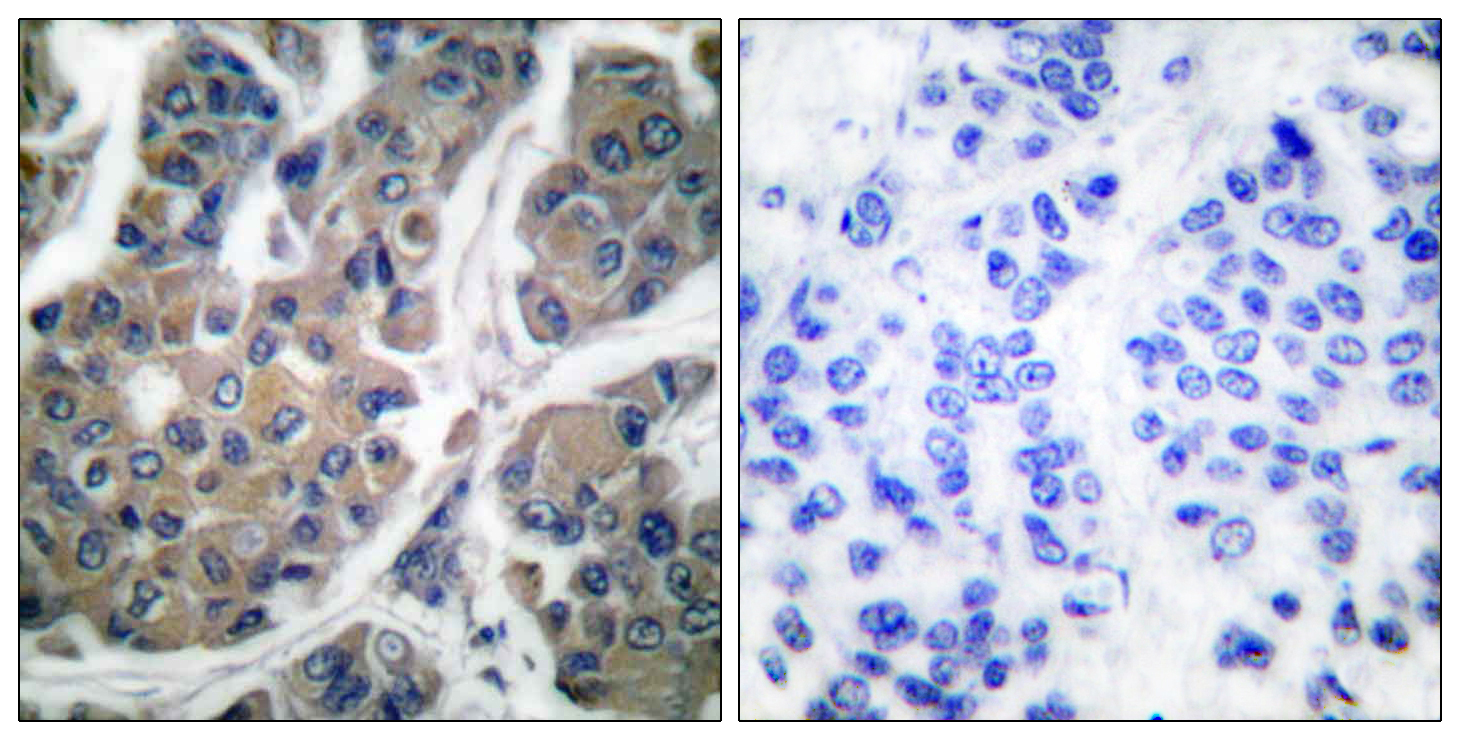
- Immunohistochemistry analysis of paraffin-embedded human breast carcinoma, using eEF2 (Phospho-Thr56) Antibody. The picture on the right is blocked with the phospho peptide.
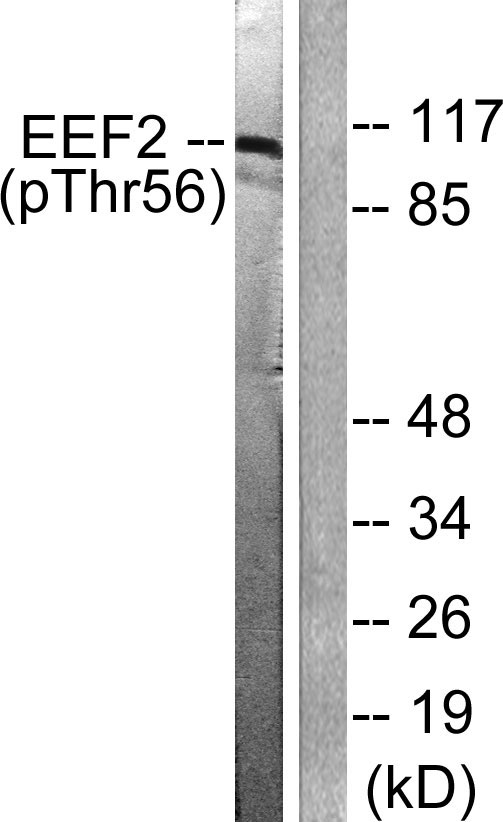
- Western blot analysis of lysates from NIH/3T3 cells treated with Serum 10% 30', using eEF2 (Phospho-Thr56) Antibody. The lane on the right is blocked with the phospho peptide.



